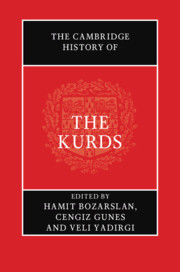Book contents
- The Cambridge History of the Kurds
- The Cambridge History of the Kurds
- Copyright page
- Contents
- Figures
- Maps
- Tables
- Contributors
- Acknowledgements
- Abbreviations
- Additional material
- Introduction
- Part I Historical Legacies
- Part II Regional Political Developments and the Kurds in the Twentieth and Twenty-First Centuries
- Part III Domestic Political Developments and the Kurds in the Twentieth and Twenty-First Centuries
- 12 Kurdish Nationalism in Turkey, 1898–2018
- 13 Why Autonomy Hasn’t Been Possible for Kurds in Turkey
- 14 The Kurdistan Region of Iraq, 1991–2018
- 15 Street Protest and Opposition in the Kurdistan Region of Iraq
- 16 Minority, State and Nation
- 17 The Kurdish Question in Syria, 1946–2019
- 18 The Yezidis in the Soviet Union
- Part IV Religion and Society
- Part V Kurdish Language
- Part VI Art, Culture and Literature
- Part VII Transversal Dynamics
- Index
- References
13 - Why Autonomy Hasn’t Been Possible for Kurds in Turkey
from Part III - Domestic Political Developments and the Kurds in the Twentieth and Twenty-First Centuries
Published online by Cambridge University Press: 13 April 2021
- The Cambridge History of the Kurds
- The Cambridge History of the Kurds
- Copyright page
- Contents
- Figures
- Maps
- Tables
- Contributors
- Acknowledgements
- Abbreviations
- Additional material
- Introduction
- Part I Historical Legacies
- Part II Regional Political Developments and the Kurds in the Twentieth and Twenty-First Centuries
- Part III Domestic Political Developments and the Kurds in the Twentieth and Twenty-First Centuries
- 12 Kurdish Nationalism in Turkey, 1898–2018
- 13 Why Autonomy Hasn’t Been Possible for Kurds in Turkey
- 14 The Kurdistan Region of Iraq, 1991–2018
- 15 Street Protest and Opposition in the Kurdistan Region of Iraq
- 16 Minority, State and Nation
- 17 The Kurdish Question in Syria, 1946–2019
- 18 The Yezidis in the Soviet Union
- Part IV Religion and Society
- Part V Kurdish Language
- Part VI Art, Culture and Literature
- Part VII Transversal Dynamics
- Index
- References
Summary
The chapter examines the antagonism of the Turkish political elite towards Kurdish autonomy claims in a broader historical and ideological context with a view to understanding how that antagonism has been codified into law and jurisprudence in Turkey. It explores answers to the question why autonomy has not been a viable political project for Kurds in today’s Turkey and one that can be realized through democratic and legal means. The chapter also explains how the enduring trajectory has led the country into an unprecedented centralist system and authoritarian rule in recent years and the repression of Kurdish claims for autonomy. In so doing, it concentrates on three main reasons behind the impossibility of Kurdish autonomy in the current political and legal status quo. First, a dominant anachronistic reading of the centralist state legacy overlooks the Ottoman legacy for organizational diversity and the Kurdish conventional self-rule. Second, a dexterously designed legal system has made unlawful autonomy as a political project, while presenting the unitary state model as the only one conceivable and fundamental to political and legal order. Third, the mainstream political elites’ ideologically driven response to the Kurds’ claim for autonomy and failure to comprehending or to deal with Kurdish nationalist sentiments and aspirations attached to it.
Keywords
- Type
- Chapter
- Information
- The Cambridge History of the Kurds , pp. 333 - 361Publisher: Cambridge University PressPrint publication year: 2021
References
- 1
- Cited by

